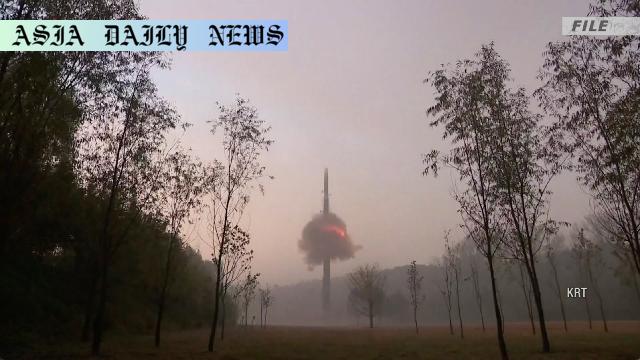ICBM: North Korea justifies missile development as self-defense amid US hostility and heightened military cooperation.
ICBM development justified by North Korea as a self-defense measure.
North Korea criticizes the US for its ‘hostile’ policies and fear-stirring strategies.
US-Japan-South Korea security cooperation cited as a key concern.
Upcoming joint military exercises escalate the need for North Korea to enhance defense.

North Korea Justifies Its ICBM Program Amid Rising US Concerns
North Korea has once again captured global attention by defending its development of intercontinental ballistic missiles (ICBMs) as a fundamental aspect of its self-defense strategy. In a bold statement issued by the defense ministry’s policy chief, the nation emphasized that its missile development is in response to what they perceive as ongoing ‘hostile’ policies from the United States. According to North Korea’s state-run media, Pyongyang insists that it is not the aggressor but is taking necessary steps to ensure the sovereignty and security of its state.
Disputed Threat Perceptions: ICBMs as a Shield or Sword?
The statement emerges in the wake of remarks by the US Northern Command, acknowledging that North Korea’s ICBM technology has advanced to the point where the US mainland could potentially fall within its range. North Korea, however, dismissed the alarm as a tactic to ‘stir public opinion’ against a ‘non-existent threat.’ Pyongyang claims that rather than posing a danger, its missile developments are a direct reaction to consistent external provocations, including ongoing US-led regional military initiatives.
Military Exercises and Regional Tensions Amplified
One of the central issues driving this escalation lies in the upcoming joint military exercises between the United States and South Korea, as well as broader security cooperation among the US, South Korea, and Japan. According to North Korea, these actions, frequently presented as defensive measures, actually justify its decision to strengthen its military deterrence capabilities. Pyongyang accuses these trilateral collaborations of being inherently antagonistic.
North Korea’s Call to Abandon ‘Hostile’ US Policies
Alongside its emphasis on the right to self-defense, North Korea’s defense ministry appealed to the United States to abandon its ‘military threats and hostile policies’ toward independent and sovereign nations. Pyongyang argues that such postures only exacerbate tensions and fuel an arms race, making the region increasingly unstable. The North suggested that a genuine commitment to peace could only be realized through significant US policy changes.
Challenges for Diplomatic Engagement
The recurrence of narratives focusing on defense and hostility highlights the fragile state of diplomatic relations between North Korea and the United States. Efforts to bring both nations to a negotiating table have remained largely unsuccessful. In this context, Pyongyang’s ICBM development poses a challenging conundrum for global powers who seek denuclearization but find little common ground with an increasingly self-reliant North Korea.
Conclusion: A Climate of Heightened Uncertainty
The latest statements from North Korea underscore ongoing complexities in international diplomacy. With the combination of North Korea’s determination to bolster its defense, upcoming military exercises amplifying tensions, and strategic posturing from key players like the United States, the region appears to be on a precarious path. Both parties will need to rethink strategies to find a middle ground and avoid escalations that could have devastating implications for the global community.Commentary
Examining the Justifications of North Korea’s ICBM Development
North Korea’s staunch defense of its ICBM program raises pressing concerns about global security and the strained dynamics of international diplomacy. Through its most recent statement, Pyongyang has sought to frame its missile development as a reaction to external provocations, particularly from the United States. This reasoning, while simplifying the broader context, reveals the extent to which North Korea perceives itself as a nation under siege.
The Role of US Policies in Escalating Tensions
A significant aspect of the North Korean response targets the US’s ‘hostile’ policies, encompassing economic sanctions, military drills, and multilateral alliances in the region. From Pyongyang’s perspective, these actions serve not merely as protective measures but as deliberate provocations compelling a defensive buildup. While the international community highlights North Korea’s aggression, it must also recognize the ramifications of such polarized strategies.
Breaking the Cycle of Provocation and Response
The cyclical nature of provocations—joint military exercises provoking responses from North Korea—continues to escalate regional tensions. If the US and its allies genuinely seek de-escalation, consideration must be given to reducing the intensity or frequency of military displays, coupled with genuine diplomatic engagement. It is evident that such a shift could lead to a better framework for peace.While the prospects for resolution remain uncertain, fostering a dialogue where both sides feel heard and secure may break the deadlock. Without such efforts, we risk further normalizing a hostile status quo, cementing a path of confrontation in one of the world’s most volatile regions.
Add A Comment


